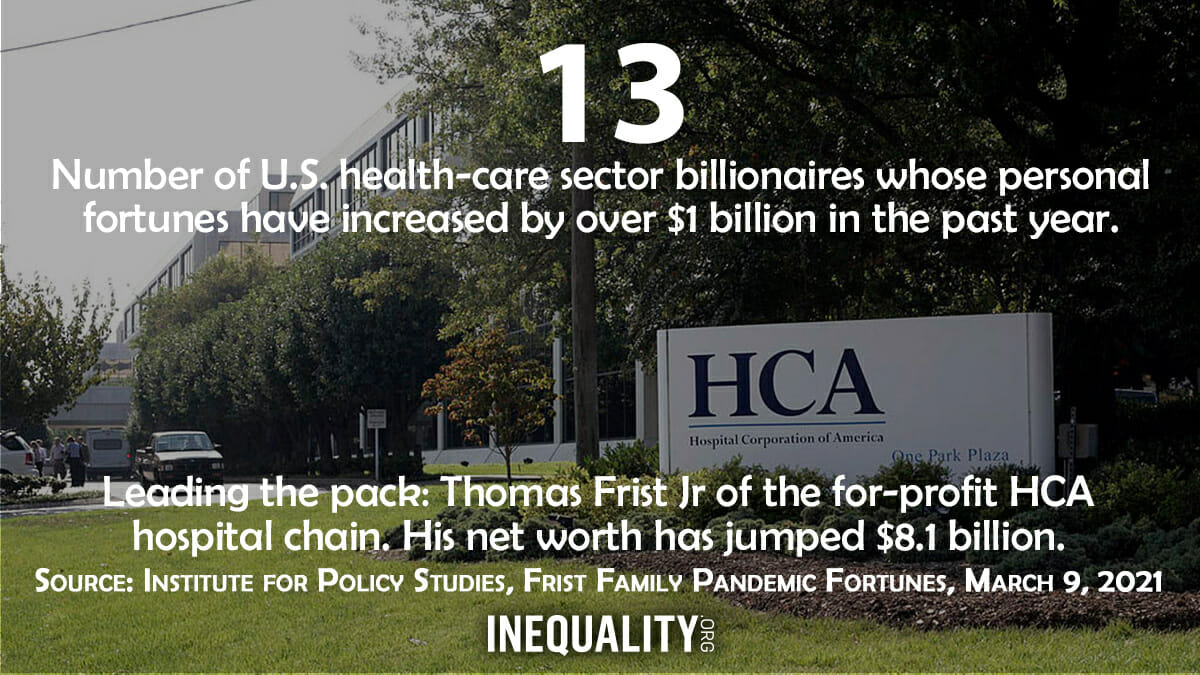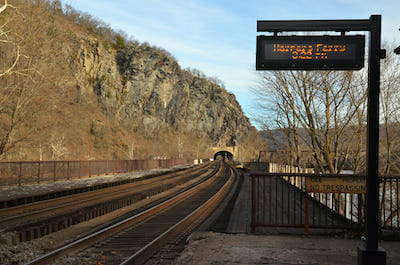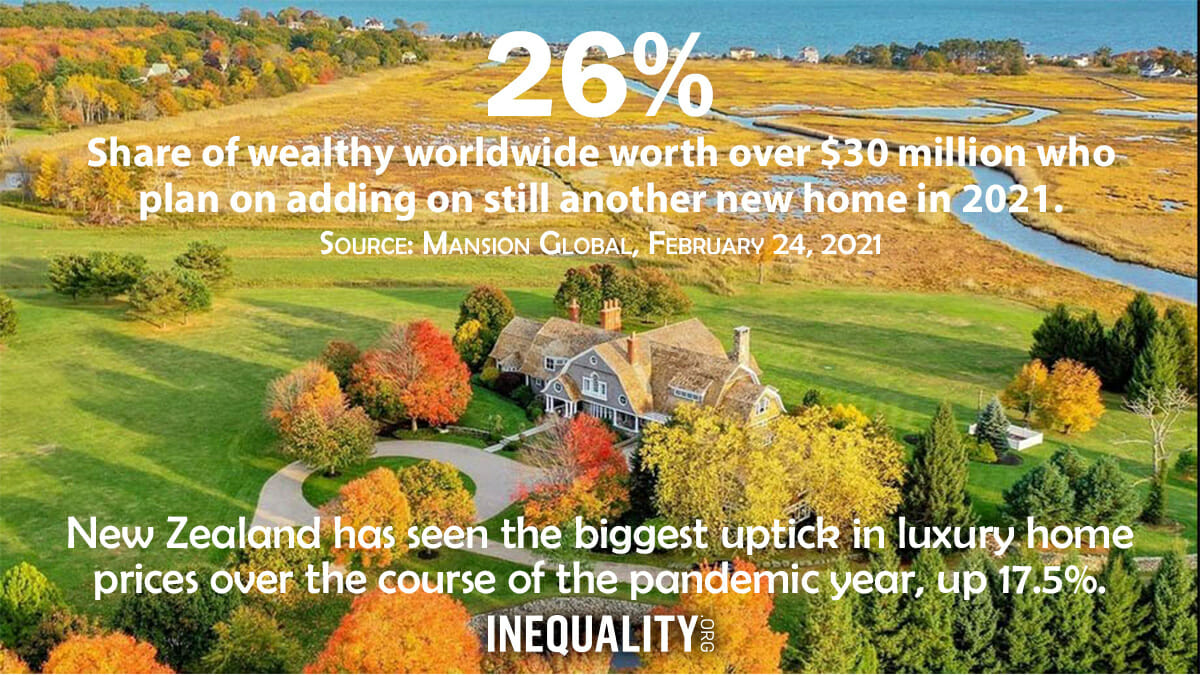| THIS WEEK |
One full year after the first U.S. official Covid-19 lockdowns, millions of people are finally and slowly recovering from the pandemic economy. But the nation’s ultra-rich have no need for a recovery. They’ve been doing quite fine all along — at average Americans’ expense.
A new analysis from our Inequality.org team and Americans for Tax Fairness has found that America’s wealthiest 657 billionaires now stand $1.3 trillion richer than they did last March.
The personal fortunes of three men alone — Jeff Bezos, Elon Musk, and Mark Zuckerberg — could foot the entire quarter-trillion-dollar cost of supplemental unemployment benefits in the latest Covid relief package and provide jobless Americans $300 a week for the next six months.
Speaking of Jeff Bezos, the Amazon CEO has been called to testify before the Senate Budget Committee Wednesday. Whether or not he shows up, our very own Sarah Anderson will be there, testifying on behalf of Inequality.org and exposing how staggering inequalities within Amazon are creating systemic problems that should deeply concern us all.
Chuck Collins and Rebekah Entralgo,
for the Institute for Policy Studies Inequality.org team |
|
| |
|
| INEQUALITY BY THE NUMBERS |
 |
|
|
|
| |
|
| FACES ON THE FRONTLINES |
 |
| The Big Freeze: Private Gain at Public Expense |
| Last month, a historic deep-freeze impacted every single county in Texas, subjecting millions throughout the state to a power generation system that has been privatized and underregulated into an absolute public-service failure. The corporations, utilities, and regulators responsible for this failure have for the most part comfortably survived the breakdown. Ordinary folks have borne the brunt of the lost power. Denita Jones, an organizer with the Poor People’s Campaign in Dallas, shares her story. |
|
| |
|
| WORDS OF WISDOM |
 |
|
|
|
| |
|
PETULANT PLUTOCRAT
OF THE WEEK |
 |
| Deep in the Heart of Texas, Singing a Looney Tune |
| The 79-year-old Houston software king Robert Brockman has never appeared on the Forbes annual list of America’s richest 400 — and he doesn’t mind at all. If the feds don’t know how much money you’re making, Brockman has always believed, they won’t know you’re avoiding taxes. And Brockman, prosecutors charged last fall, has been doing just that — for decades. He now faces what the Wall Street Journal describes as “the largest criminal case ever” for evading personal taxes. The tax evasion charges against Brockman revolve around a private equity firm he helped launch in 2000. He hid $2 billion in earnings from that firm, say prosecutors, and is currently sitting on an overall $10-billion fortune. Brockman’s defense? He’s suffering from dementia, his lawyers say, and can’t help prove his own innocence. Brockman first began building a case for his dementia in 2018, after a top aide agreed to cooperate with federal authorities. His dementia claim will be going before a judge this June. |
|
| |
|
| BOLD SOLUTIONS |
 |
| Transit Equity for Rural and Small Towns, Too
|
| Throughout America, millions of people depend on public transit that doesn’t fully meet their needs, while millions more have no access at all. The pandemic has exacerbated the transportation inequities that pre-date Covid-19, inequities that disproportionately impact people living with disabilities as well as those who live in rural areas. The federal funding to meet everyone’s transit needs already exists. But this funding disproportionately privileges highways over public transit. Kayla Soren, a Next Leader at the Institute for Policy Studies, explains why investing in public transit ought to become a priority for us all. |
|
| |
|
| GREED AT A GLANCE |
 |
|
|
|
| |
|
| TOO MUCH |
 |
| Our Greediest Corporation Just Become Greedier |
| Walmart, the single biggest corporate contributor to inequality in the United States over the past half-century, is doubling down on greed. The giant retailer has just named the recently retired AT&T CEO Randall Stephenson to its 12-person board of directors. Stephenson never quite became a national household name in his years at AT&T. But his career has almost perfectly personified the ethos inside Corporate America’s executive suites: grab as much as you can, as fast as you can, from your workers and the public at large. In 2019, for instance, Stephenson pulled down $32 million. In that same year, AT&T eliminated 7.6 percent of its workforce, about 20,000 jobs. New research details just how common, within Corporate America, execs like Randall Stephenson have become. Inequality.org co-editor Sam Pizzigati has more. |
|
|
|
| |
|
| MUST READS |
This week on Inequality.org
Bob Lord, The Simple Rules of Wealth Inequality. The rich won’t be paying their fair share of taxes as long as our tax system speeds wealth’s concentration.
Chuck Collins, Billionaire Wealth Gains Could Pay for Two-Thirds of Covid Relief Bill. America’s wealthiest 657 billionaires stand $1.3 trillion richer than they did last March.
Rebekah Entralgo, Biden’s Relief Package Is a Huge Step Forward for Workers. One of the largest anti-poverty programs ever passed will also save worker pensions throughout the country.
Elsewhere on the Web
Nitasha Tiku and Jay Greene, The billionaire boom, Washington Post. Elon Musk, Jeff Bezos, and seven other tech titans have made over $360 billion during the pandemic. Will that greed grab finally shatter the myth of the benevolent billionaire?
Michael Hiltzik, Countering Dem relief package, GOP proposes a huge giveaway to the rich, Los Angeles Times. Half of the Senate Republican caucus has signed on to another attempt to repeal the estate tax, a move that would provide a massive tax break to the billionaire class.
Alec MacGillis, Amazon and the Breaking of Baltimore, New York Times. The ugly reality of the rich-get-richer dynamic of today’s economy that has growth and prosperity flowing to the handful of cities home to the tech giants that control ever more of daily commerce.
Kerry Flynn, Being owned by a billionaire is a struggling newsroom's dream. But it can turn into a nightmare, CNN Business. Horror stories from the billionaire-owned media front lines.
Jason Grotto, How Unfair Property Taxes Keep Black Families From Gaining Wealth, Bloomberg. Still another reason we need a tax on the wealth of the wealthy, not a penalty that squeezes modest-income homeowners.
Kelly Grotke, Are Endowments Damaging Colleges and Universities? American Prospect. Enormous investment management fees are pouring out of nearly every substantial endowment and into the pockets of fund managers.
Mark Rank and Lawrence Eppard, The ‘American Dream’ of upward mobility is broken. Look at the numbers, Guardian. Equality of opportunity has faded away in a deeply unequal United States.
Chye-Ching Huang, How Biden Funds His Next Bill: Shrink the $7.5 Trillion Tax Gap, New York Times. The underfunded IRS often can’t even detect or blatant tax cheating by the rich and big businesses.
Brendan O’Neil, The terrifying rise of the tech aristocracy, Spiked. An interview with Joel Kotkin, author of the newly published book, The Coming of Neo-Feudalism: A Warning to the Global Middle Class. |
|
| |
|
| A FINAL FIGURE |
 |
|
|
|
| |
|
| BE THE 1% (NO, NOT THAT 1%) |
 |
Our goal for 2021: that 1% of our Inequality.org subscribers become monthly sustainers and help grow our newsletter and research efforts. Be the 1%, for as little as $3 a month! |
|
|
|
| |
|
|